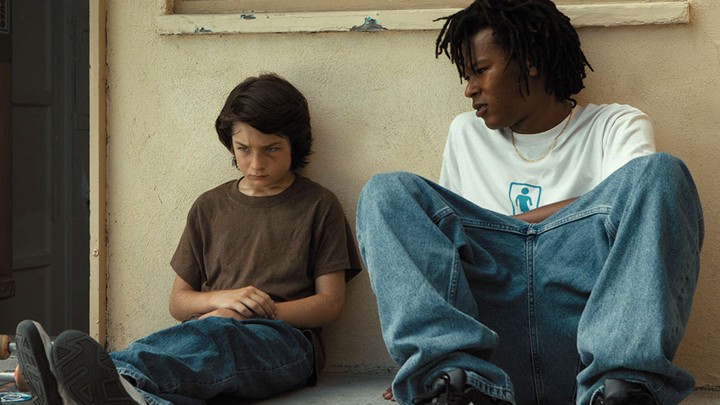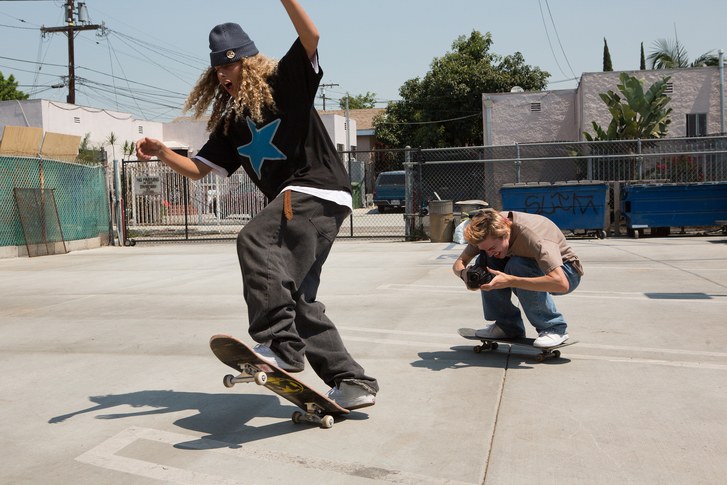“You’re so cute. You’re like at that age before guys become dicks,” muses a perceptive partygoer to protagonist Stevie (Sunny Suljic) AKA “Sunburn,” a thirteen-year-old barnacle on the LA skate scene circa—you guessed it—the mid 1990s. Marking the directorial debut of actor Jonah Hill, Mid90s probes this adolescent inflection point. For Stevie, afternoons spent skating and shooting the shit dissolve into drunken evenings that end beneath a set of Ninja Turtles bedsheets in the suburban home he shares with his single mom (Katherine Waterston) and volatile older brother (Lucas Hedges).
If not overtly autobiographical, the film feels deeply personal. Hill himself came up on LA’s west side in the waning years of the twentieth century—and he fills each frame with authentic ephemera of the era, from Super Nintendo to Ren & Stimpy to Nirvana to Bill Clinton. Its nostalgia catnip for a certain generation, but the iconography masks an ugly undercurrent. Contrasting moments of comedy and comradery are dark hints of the tragic and the cruel. These influences snake their way insidiously into Stevie’s life, further straining his relationship with his family and poisoning his once wide-eyed worldview.

Mid90s is unflinching in its depiction of selfish and impulsive teenagers, and uninterested in tidy redemption. It can sometimes be difficult to root for the characters as they stumble from one bad decision to the next, but Hill is helped along by an incredible cast of up-and-comers who bring these flawed outcasts to life. Of particular note is Na-kel Smith as Ray, pro skater-hopeful and surrogate sibling to Stevie when he’s not at home being pummeled by his actual older brother. Rounding out the crew is Olan Prenatt as “Fuckshit” (yes, really), Ryder McLaughlin as “Fourth Grade,” and Gio Galicia as Ian. Together, they comprise a dysfunctional makeshift family whose relationships and collective behavior are equal parts endearing and alienating.
Because Mid90s is Hill’s first feature, it’s easiest to analyze his approach to character in the context of his apparent influences. Harmony Korine’s Kids comes to mind, though Hill is nowhere near as provocative or antagonistic a filmmaker. A better benchmark, maybe, is Marty Scorsese. In a seemingly throwaway scene midway through the movie, Stevie arrives home after bailing on family “Blockbuster Night.” In his absence, his mom has rented Goodfellas—another film perhaps not-so-coincidentally featuring a cast of morally dubious characters.

Yet the scene Stevie walks in on finds Joe Pesci’s character, a Mafioso with a hair-trigger temper, sitting down to dinner with his mother. “I like this one,” Pesci deadpans, blithely critiquing her art. “One dog goes one way, and the other dog goes the other way.” It’s a scene that not only establishes the distance between man and matriarch—it establishes the dichotomy at the core of his character; a murderer isn’t a murderer at dinner with his mother. Likewise, Stevie and his friends aren’t one-note ballers and brawlers. They’re kids too.
Another boon to Hill is the cinematography of Christopher Blauvelt (Don’t Worry, He Won’t Get Far on Foot; Meek’s Cutoff; The Discoverers), who captures a sunbaked Californian summer with uncommon authenticity. Shot on 16mm film in a tight 4:3 aspect ratio, Mid90s feels scrappy and raw, lo-fi yet lived in. From the stucco of suburban homes to the freedom of sloping city streets, the aesthetic is uncompromising and all-encompassing.
Mid90s is an accomplished if unambitious first effort for director Jonah Hill. The filmmaker shows real talent and true potential behind the lens, though it’s hard not to shake the impression that this esoteric snapshot means more to the artist than it does to the audience. Perhaps it’s a matter of setting expectations upfront. The title, aside from being egregiously generic, suggests an attempt to capture something universal about the era, yet the film reflects only a single perspective—Hill’s. Everyone else is just along for the ride.